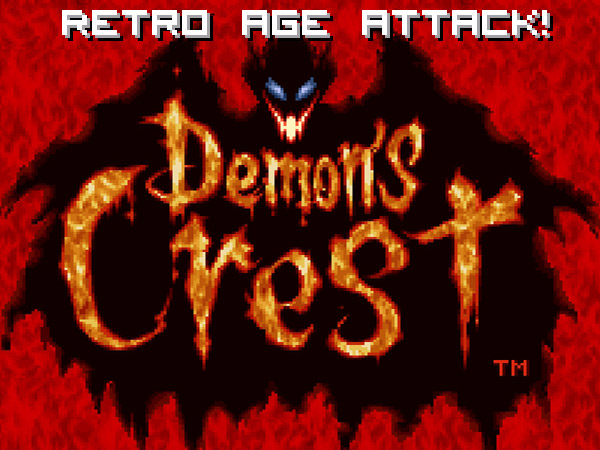 Demon?s Crest was released by Capcom on the Super Nintendo in November of 1994. It was the third game to feature Firebrand, a Red Arremer previously featured as an enemy in the Ghosts ?n Goblins / Ghouls ?n Ghosts series of titles. Firebrand?s first adventure was on the Game Boy in Gargoyle?s Quest, released in 1990. His second adventure was in Gargoyle?s Quest II, released on the NES in 1992.
Demon?s Crest was released by Capcom on the Super Nintendo in November of 1994. It was the third game to feature Firebrand, a Red Arremer previously featured as an enemy in the Ghosts ?n Goblins / Ghouls ?n Ghosts series of titles. Firebrand?s first adventure was on the Game Boy in Gargoyle?s Quest, released in 1990. His second adventure was in Gargoyle?s Quest II, released on the NES in 1992.
It wasn?t favorably received for its time, and has been recorded as actually achieving negative sales numbers by Nintendo Power magazine. Revisiting the game now for Retro Age Attack makes me wonder what people were thinking, because it?s actually a pretty awesome platformer. It evokes a mix of styles, incorporating a little Castlevania in both its art direction and theme, mixed with the gameplay of titles like Mega Man X and Super Metroid.
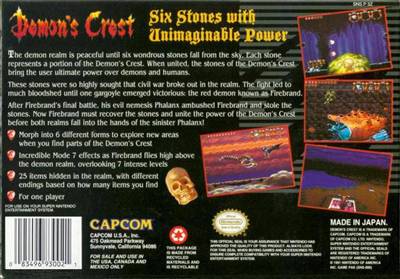 The Mega Man X comparison is apt, considering the game was produced by Tokuro Fujiwara, who is also credited as the producer for the Blue Bomber?s first entry on the SNES. Fujiwara was also behind the first two Gargoyle?s Quest titles, the Ghosts ?n Goblins series, and the majority of the beloved Disney titles that Capcom produced in the 8-bit and 16-bit era of video games.
The Mega Man X comparison is apt, considering the game was produced by Tokuro Fujiwara, who is also credited as the producer for the Blue Bomber?s first entry on the SNES. Fujiwara was also behind the first two Gargoyle?s Quest titles, the Ghosts ?n Goblins series, and the majority of the beloved Disney titles that Capcom produced in the 8-bit and 16-bit era of video games.
In Demon?s Crest you?ll traverse a number of side scrolling levels, battling against a number of supernatural enemies and large bosses in an effort to collect a series of elemental crests. These crests have been scattered by Firebrand?s nemesis Phalanx, after Firebrand had collected the crests to take control of the Demons Realm. Phalanx ambushed Firebrand after a taxing battle against the Demon Dragon, and imprisoned him inside a Colosseum, which is where you begin the game.
The level structure isn?t linear, in fact, it requires quite a bit of backtracking. As Firebrand gains crests, he?ll unlock new forms with different abilities, which allow him to gain access to previously unreachable areas.
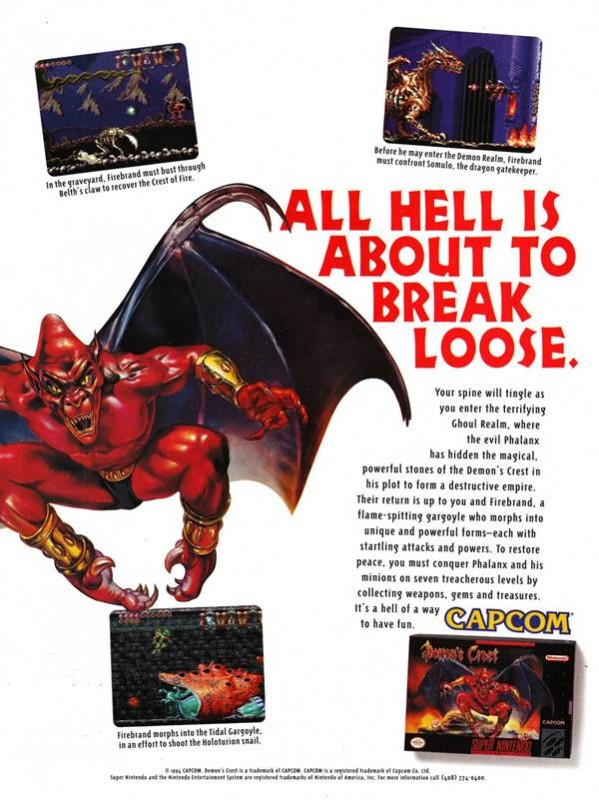
Sound familiar? Yeah, the formula is pretty reminiscent of Super Metroid, but lacks the giant map of Nintendo?s space faring classic. It?s a bit more in line with Mega Man X for that reason, as the levels are pretty self-contained. In a nod to the Gargoyle?s Quest games, there is an overworld map you can fly around in which makes use of the classic Mode 7 effect that the SNES was known for. But the overworld map is pretty limited, and just breaks up the stages instead of using a standard level select screen.
The game really shines from the design side of things. The original Gargoyle?s Quest titles had a bit more cartoony look going for them, which I?m sure comes from the fact that they both debuted on systems that weren?t up particularly powerhouses in the graphics department. That design is ditched for Demon?s Crest, which opts for a more gothic, horror feel that fits the world Firebrand exists in quite well. It also puts the game more in line with the Ghosts ?n Goblins look, which never shied away from horrific creature designs.
The soundtrack, composed by Toshihiko Horiyama, makes use of a heavy organ style that fits the world design quite well. It?s constantly brooding melody helps to drive home the dark setting of the game. Horiyama might be a familiar name for Capcom fans, as he also produced a number of memorable tracks including music for titles like Mega Man X, The Misadventures of Tron Bonne, and the more recent Apollo Justice: Ace Attorney.
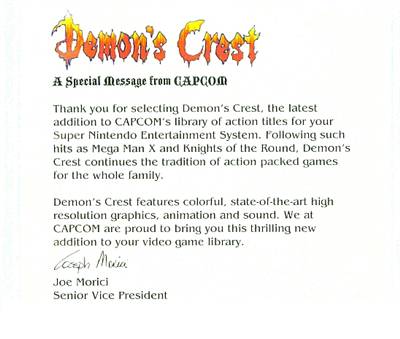 The assortment of bosses in Demon?s Crest is certainly one of the best features. The game even begins with a boss fight against a massive undead dragon called Somulo. Granted, he?s a bit of a push over, but it?s a neat start to the game that features you defeating the dragon to break free of your prison.
The assortment of bosses in Demon?s Crest is certainly one of the best features. The game even begins with a boss fight against a massive undead dragon called Somulo. Granted, he?s a bit of a push over, but it?s a neat start to the game that features you defeating the dragon to break free of your prison.
From there you face off against another boss labeled the Hippogriff, a flying creature that dive bombs Firebrand and tosses out a few feathers for projectiles. Shortly thereafter you battle against General Arma, who becomes a constant thorn in your side throughout the game, and features an opening set of moves similar to the Hippogriff.
One of the more interesting boss designs you encounter early on is against Ovnunu, a boss composed of green goo and eyeballs. You?ll encounter him in a vertical passage, and upon entering the passage he?ll awake and chase you upwards. Once you reach the opening at the top the actual fight begins, and he?ll toss out small eyeballs in groups that fly randomly around the stage. Once the mini-eyeballs are defeated Ovnunu will emerge from the ooze, as a larger eyeball that also has a projectile attack. He?s the first challenging boss of the game, and if you have trouble against him prepare to get your ass kicked throughout the rest of Demon?s Crest.
While Demon?s Crest wasn?t well received by the public upon its release, it?s certainly garnered a fan following over the past decade and a half. Even Capcom seems to recognize that Firebrand has his own set of fans, and the anti-hero was recently featured as a combatant in the recent update to Marvel vs. Capcom 3.
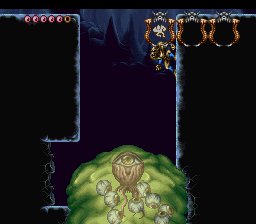 And while the game didn?t have great sales numbers, it was pretty well received by critics. It was scored by Electronic Gaming Magazine in issue #63, at a point that magazine?s life span where the mag was at odds with developer Capcom regarding review scores for Super Street Fighter II Turbo. The reviewers, composed of Ed Semrad, Danyon Carpenter, Al Manual, and Sushi-X scored the game as 9/8/8/8. It garnered the Gold Award that month, along with Mortal Kombat 2 on the SNES. It fell behind Final Fantasy III that month, which was awarded the Platinum Award.
And while the game didn?t have great sales numbers, it was pretty well received by critics. It was scored by Electronic Gaming Magazine in issue #63, at a point that magazine?s life span where the mag was at odds with developer Capcom regarding review scores for Super Street Fighter II Turbo. The reviewers, composed of Ed Semrad, Danyon Carpenter, Al Manual, and Sushi-X scored the game as 9/8/8/8. It garnered the Gold Award that month, along with Mortal Kombat 2 on the SNES. It fell behind Final Fantasy III that month, which was awarded the Platinum Award.
Nintendo Power covered and reviewed the game in their December 1994 issue, using their odd 1 to 5 scoring system at the time. It scored 3.9 in Graphics and Sound, 3.3 in Play Control, 3.8 in Challenge, and 3.7 in Theme and Fun. When broken down into positive and negative points, the only thing listed was that Capcom had ordered a limited cart run of the game so it might be hard to find.
The November issue of Gamepro featured a review by, uh, Captain Squideo, and scored Demon?s Crest with a 4.5 for Graphics, 3.0 for Sound, 4.0 for Control, and 4.5 for Fun Factor. The only real negative remarks consisted of a complaint against the menu screen needed for switching between Gargoyle forms, and that the soundtrack was repetitive, and lacked voices for the creatures.
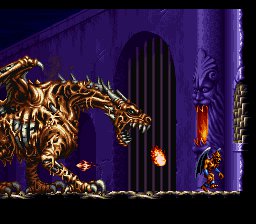 The game has yet to see any kind of port or release, which is disappointing. It seems ripe for a Virtual Console release on the Wii at least, especially considering Gargoyle?s Quest was recently released for the 3DS Virtual Console service.
The game has yet to see any kind of port or release, which is disappointing. It seems ripe for a Virtual Console release on the Wii at least, especially considering Gargoyle?s Quest was recently released for the 3DS Virtual Console service.
The cart itself isn?t particularly rare if you?re looking to get a copy of the game, but cart only prices do seem a little steep at around the $20 mark. But, it?s definitely a game worth seeking out. It can be pretty short if you?re just looking to blow through the game, but the multiple paths, challenging difficulty, and true ending can take some time to master. I highly suggest this particular retro gem, as it?s definitely one of the best Capcom releases from the 16-bit era and holds up well today.

